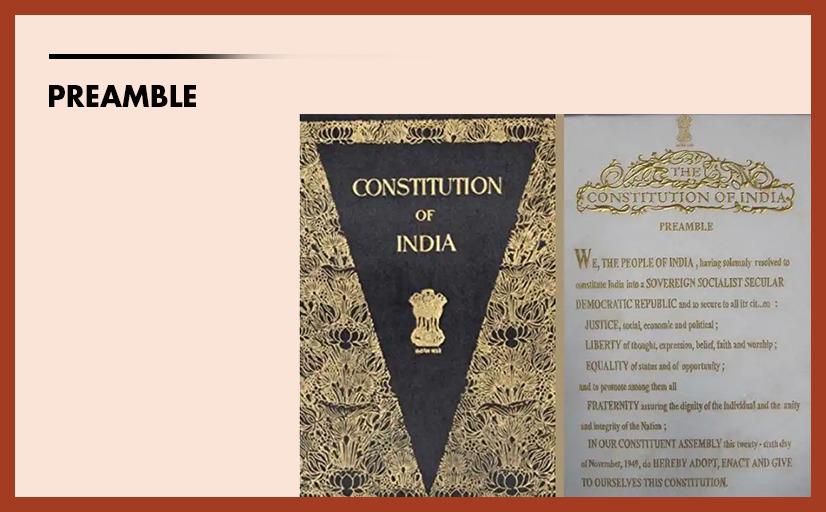
PREAMBLE
The Constitution of India's "Preamble" is a succinct introductory statement that outlines the document's overarching goals and guiding principles.
PREAMBLE

The Constitution of India's "Preamble" is a succinct introductory statement that outlines the document's overarching goals and guiding principles. Furthermore, it identifies the source of the document's authority, the people. The Indian Constituent Assembly voted it on November 26, 1949, and it took effect on January 26, 1950.
The Preamble of India
WE, THE PEOPLE OF INDIA, having solemnly resolved to constitute India into a SOVEREIGN, SOCIALIST, SECULAR DEMOCRATIC REPUBLIC and to secure to all its citizens:
JUSTICE, social, economic and political;
LIBERTY of thought, expression, belief, faith and worship;
EQUALITY of status and opportunity, and to promote among them all
FRATERNITY assuring the dignity of the individual and the unity and integrity of the Nation;
IN OUR CONSTITUENT ASSEMBLY, this twenty-sixth day of November 1949, do HEREBY ADOPT, ENACT AND GIVE TO OURSELVES THIS CONSTITUTION.
The Preamble of India – Objective Resolution
In 1946, Jawaharlal Nehru introduced the Objective Resolution outlining the constitutional structure. The official date was January 22, 1947. It became official on January 22, 1947. It influenced the formation of the Indian Constitution, and the Preamble of the Indian Constitution incorporates its modified version.
The objective resolution emphasized the following fundamental principles:
- India's Constitutional Assembly's determination to maintain its republican, independent status
- The creation of an Indian Constitution
- To transform all pre-independence Indian territories into a unified post-independence Indian state.
- As reflected in the Indian Constitution, residual powers and autonomy in such states must be realized.
- In order to achieve a union with power that will be distinct from that which will be granted to such states
- The Indian people are the country's source of strength, authority, sovereignty, and independence.
- Support the rights to freedoms of expression, association, and association with others for any purpose, subject to the law and public morality before the law, as well as to justice, social, economic, and political equality of opportunity.
- To give minorities, tribal areas, and other downtrodden and backward classes adequate protection.
- To promote global harmony and prosperity.
Interesting Facts about the Preamble of the Indian Constitution
- It was implemented following the adoption of India's entire Constitution.
- The 42nd Constitutional Amendment Act of 1976 added the word "secular" to the Indian Constitution's Preamble.
- All Indian citizens are guaranteed freedom of religion in the Preamble.
- The Preamble borrows the Soviet Union (Russia) Constitution's notion of social, economic, and political justice.
- The French Constitution serves as a model for the Republic and the principles of liberty, equality, and fraternity.
- The American Constitution was the first to introduce the Preamble.
Four Main Ingredients of the Indian Preamble
The table below lists the four main components of the Indian Preamble: the Indian Constitution's source, the nature of the Indian State, the Constitution of India's objectives, and the date the Indian State was established.
The Preamble to the Indian Constitution
Source of the Indian Constitution
The Indian Constitution derives its authority from the Indian People. The phrase "We, the People of India", echoes this.
The Indian State's Nature
India is referred to as a sovereign, secular, republican, secular, and democratic country in the Preamble of India.
The Indian Constitution's goals
The Preamble of the Indian Constitution lists Justice, Liberty, Equality, and Fraternity as its goals.
Date of the Indian Constitution's Adoption
The Indian Constitution was enacted on November 26, 1949.
Keywords in the Preamble of the Indian Constitution
The Preamble of India contains a number of significant keywords, including
- Sovereign
- Socialist
- Secular
- Democratic
- Republic
- Justice
- Liberty
- Equality
- Fraternity
